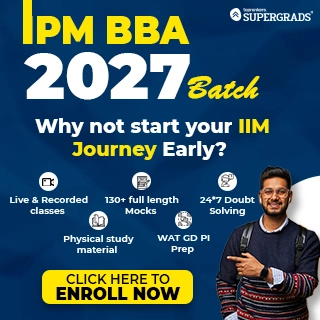Short Tricks to Solve Reading Comprehension in Aptitude Exams
January 27, 2026
Summary: Master the art of acing Reading Comprehension (RC) questions in aptitude exams with these effective short tricks. This article offers insightful strategies and short tricks to solve reading comprehension in aptitude exams to help you decode passages swiftly, enhancing your overall performance in aptitude tests.
Reading comprehension (RC) questions are common in aptitude exams, challenging candidates' reading and analytical skills.
These questions assess your ability to understand, interpret, and draw conclusions from written passages. While RC questions might seem daunting, mastering a few short tricks can significantly improve your accuracy and speed in solving them.
In this article, we will share valuable preparation tips and 10 RC questions with answers that will boost your confidence in tackling these challenges.
Let's check the short tricks to solve reading comprehension in aptitude exams!
Table of Contents
Short Tricks to Solve Reading Comprehension in Aptitude Exams 2025
To do well in Reading Comprehension questions in aptitude exams, it is essential to practice specific techniques.
These include skimming the passage to get the main points, scanning for important words like proper nouns and conjunctions, focusing more on the first and last paragraph, anticipating what will come next in the passage, and reading any given comprehension at least twice.
Additionally, visiting IPMAT Mocks to access various passages can further help with practice.
Given below are some of the short tricks to solve reading comprehension in aptitude exams
1. Skim the Passage
- Start with a rapid reading of the passage to understand its overall theme and organization.
- Pay special attention to the passage's tone (i.e., informative, argumentative, critical).
- Don't get bogged down on hard words—the idea is to get a general sense, not to know everything.
2. Focus on Keywords
- Find keywords like proper nouns, numbers, dates, conjunctions (however, therefore, but), and stressed words (important, significant, crucial, etc.).
- These terms tend to signal significant concepts or opposing perspectives and thus are effective for responding to inference questions.
- Highlighting or mentally marking these keywords can facilitate rapid navigation while solving questions.
Read: How do I solve reading comprehension for IPMAT?
3. Take Notes
Write down important points, including:
- The central argument or view expressed in the passage.
- Any evidence or supporting examples.
- The author's standpoint (neutral, biased, critical, etc.).
Make them brief and concise—these are to jog your memory when responding to questions.
4. Avoid Overreading
- Don't overthink every sentence—aptitude tests measure comprehension skills, not close literary analysis.
- Once you’ve extracted the necessary information, move on to the questions.
- If a question seems confusing, revisit only the relevant section instead of re-reading the entire passage.
5. Predict Answers
- Before looking at the multiple-choice answers, predict a possible answer based on your understanding of the passage.
- This also avoids falling prey to similar incorrect answer choices.
- If your predicted answer matches an option, it’s likely correct.
6. Answer Wh-Questions First
- Begin with questions that start with Who, What, Where, When, Why, and How since they relate to explicitly stated information in the passage.
- These questions are less complicated and faster to respond to than inference-based or tone-based questions.
- Working through them can create momentum and provide confidence for more complex questions.
These were the short tricks to solve reading comprehension in aptitude exams.
Short Tricks to Solve Reading Comprehension in Aptitude Exams: 10 Questions
English sections are strongly emphasized in many Aptitude Exams, with Reading Comprehension being the most significant.
This particular portion of the English section is often the most challenging for test takers due to its time-intensive nature.
Other topics included in the English section are -
- Para Jumbles
- Vocabulary
- Cloze Test, and more
Consequently, it is frequently tricky for examinees to achieve a high score in this test portion.
Read: How to improve reading comprehension for CAT Exam
Short Tricks to Solve Reading Comprehension in Aptitude Exams: Sample Passage 1
The honeybee is a remarkable insect known for its complex social structure and vital role in pollination.
Worker bees gather nectar from flowers and convert it into honey through enzymatic reaction.
This honey serves as a primary food source for the bee colony during the winter months.
Question 1: What is the primary role of worker bees?
Answer: The primary role of worker bees is to gather nectar from flowers and convert it into honey.
Question 2: Why is honey important for the bee colony?
Answer: Honey serves as a primary food source for the bee colony during the winter months.
Read: Best Ways to Improve Quantitative Aptitude for BBA Entrance Exam
Question 3: What is the significance of honeybees in pollination?
Answer: Honeybees play a vital role in pollination, aiding in the reproduction of various plant species.
Question 4: What is the process by which nectar is converted into honey?
Answer: Nectar is converted into honey through an enzymatic reaction.
Read: NTA CUET Aptitude Preparation Tips
Question 5: What is the primary function of the honeybee's complex social structure?
Answer: The complex social structure of honeybees allows for efficient gathering, processing, and storage of nectar and honey.
Question 6: When does the bee colony primarily rely on honey?
Answer: The bee colony primarily relies on honey during the winter months.
Question 7: How do worker bees contribute to the bee colony's survival?
Answer: Worker bees contribute to the bee colony's survival by converting nectar into honey, which serves as a source of sustenance.
Read: Triangle Questions For Aptitude Exams
Question 8: What food source do honeybees depend on during the winter?
Answer: Honeybees depend on the stored honey as their primary food source during the winter.
Question 9: What does the passage highlight about the enzymatic reaction in bees?
Answer: The passage highlights that an enzymatic reaction converts nectar into honey.
Question 10: Which season is particularly challenging for the bee colony regarding food availability?
Answer: Winter is a challenging season for the bee colony regarding food availability.
Short Tricks to Solve Reading Comprehension in Aptitude Exams: Sample Passage 2
The cheetah is the fastest land animal, capable of reaching speeds up to 75 miles per hour in short bursts, covering distances of up to 1,500 feet.
Unlike other big cats, cheetahs rely on their speed rather than strength for hunting. They have lightweight bodies, long legs, and specialized muscles that allow rapid acceleration.
However, their speed comes at a cost. Cheetahs tire quickly and require extended periods of rest after a chase.
Additionally, they face threats from habitat loss, poaching, and competition with larger predators such as lions and hyenas.
They struggle to protect their kills and cubs from stronger carnivores despite their agility.
Question 1: What makes cheetahs unique among big cats?
Answer: Cheetahs are unique because they rely on speed rather than strength for hunting.
Question 2: How fast can a cheetah run?
Answer: A cheetah can reach up to 75 miles per hour in short bursts.
Question 3: What adaptations help cheetahs achieve their high speed?
Answer: Cheetahs have a lightweight body, long legs, and specialized muscles for rapid acceleration.
Question 4: Why do cheetahs require extended rest periods after running?
Answer: Cheetahs tire quickly due to the energy required for high-speed chases.
Read: Time and Work Questions for Aptitude Exams
Question 5: What are the major threats faced by cheetahs?
Answer: The primary threats include habitat loss, poaching, and competition from larger predators like lions and hyenas.
Question 6: How do cheetahs struggle with protecting their prey?
Answer: Cheetahs struggle to protect their kills from stronger carnivores like lions and hyenas.
Question 7: What makes cheetahs different from lions and tigers in terms of hunting?
Answer: Cheetahs depend on speed to catch their prey, unlike lions and tigers, which rely on strength.
Question 8: What is one disadvantage of the cheetah’s hunting style?
Answer: Cheetahs get exhausted quickly, making them vulnerable after a chase.
Question 9: What is one reason why cheetahs face survival challenges?
Answer: Habitat loss is a significant reason for their declining population.
Question 10: Why do cheetahs struggle to protect their cubs?
Answer: Cheetah cubs are at risk because larger predators often attack and kill them.
Mastering Reading Comprehension questions in aptitude exams requires a combination of strategic reading and quick thinking.
By following the short tricks to solve reading comprehension in aptitude exams and practising with the provided RC questions, you'll be well-equipped to tackle these questions efficiently.
Remember, practice makes perfect, and with consistent effort, you can enhance your ability to decode passages and extract crucial information, thus improving your performance in aptitude exams.
Key Takeaways
- Strategic Reading Enhances RC Performance—Techniques like skimming, scanning, and keyword identification help readers quickly grasp the passage’s key ideas.
- Time Management is Crucial – Avoid overreading; focus on essential details and move on to answering questions efficiently.
- Predictive Answering Increases Accuracy – Forming an answer before looking at options reduces confusion and eliminates incorrect choices.
- Practice with Mock Tests – Regularly solving RC passages from IPMAT Mocks improves speed, comprehension, and confidence.
- Focus on Easy Questions First – Answering "Wh-" questions before tackling inference-based ones builds momentum and boosts efficiency.
Table of contents
or reload the browser
Frequently Asked Questions
What are the five types of Reading Comprehension?

What are the elements of Reading Comprehension?

How to Solve Reading Comprehension Questions in IPMAT and DU JAT?

Will there be direct questions in Reading Comprehension?

How to improve my comprehension Skills?

What are some of the short tricks to solve reading comprehension in aptitude exams?









SHARE